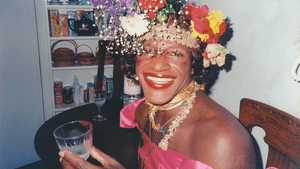Stay in the Loop
BSR publishes on a weekly schedule, with an email newsletter every Wednesday and Thursday morning. There’s no paywall, and subscribing is always free.
Marsha P. Johnson documentary dogged by controversy
David France's 'The Life and Death of Marsha P. Johnson'

The Netflix documentary The Death and Life of Marsha P. Johnson introduces audiences to Marsha “Pay It No Mind” Johnson, one of the most prominent figures in the 1969 Stonewall uprising. Stonewall, the movement, was named after the East Village bar where NYPD harassment sparked six days of protest and kickstarted the gay liberation movement we know today.
In addition to her strong presence in lower Manhattan’s gay community, Johnson cofounded the Street Transvestite Action Revolutionaries (STAR). The group, created with her close friend Sylvia Rivera, provided shelter for queer and trans people otherwise living on the streets.
The disappeared
However, Johnson’s death remains a mystery. On July 6, 1992, her body was found in the Hudson River. Law enforcement deemed her death a suicide, but those who knew her personally disagree. Victoria Cruz, a transgender activist and crime-victim advocate for the LGBTQ organization Anti-Violence Project, is one of those people.
The documentary follows Cruz’s attempt to investigate Johnson’s mysterious death. With every new lead and discovery, she faces frustration and bureaucratic corruption. Retired NYPD officers don’t want to speak to her. Sources she interviews tell inconsistent stories. Even the medical examiner’s office claims to have misplaced Johnson’s autopsy report. The neverending circle illustrates how trans women’s murder cases quickly turn cold and are never resolved. After all, if Johnson, one of the most prominent figures in queer history, can’t find justice, then who among the marginalized will?
While the film centers Johnson’s biography and legacy, its larger message is that her unresolved case isn’t unique. Transgender women, especially trans women of color, face the most severe violence within the LGBTQ community. According to the Gay & Lesbian Alliance Against Defamation, so far in 2017 alone, 23 transgender people have been murdered. (The film also discusses inaccurate media coverage of trans murders; news organizations often fail to recognize victims as transgender.) Additionally, because of intersecting oppressions rooted in race, class, and gender, transgender people of color also face economic violence through high rates of poverty, homelessness, and unemployment.
However, the film does not discuss media representation, for one obvious reason: the filmmaker, David France, is a cisgender white man.
"And you all treat me this way?"
Johnson wasn’t the only trans activist who felt ignored by the rest of the gay liberation movement in the years after Stonewall. The film includes archival footage of Sylvia Rivera getting booed off the stage during a speech at the 1973 Gay Pride March in New York City. She responds, “You all tell me to go and hide my tail between my legs… I have been beaten. I have had my nose broken… I lost my job. I lost my apartment for gay liberation. And you all treat me this way?”
It’s interesting to see this self-awareness told through a white, cis, but still queer lens. Reina Gossett, a black transgender activist, is currently working on a film about Johnson (set for release in 2018) titled Happy Birthday, Marsha!, using film she’s archived since 2012. In an October 6, 2017 Instagram post, Gossett charged that France had used her archival work without credit or permission. Days later, in an op-ed for Allure, trans activist and writer Janet Mock announced her solidarity with Gossett. [Ed. note: See France's response here.]
Unfortunately, this white and cis gaze makes The Death and Life of Marsha P. Johnson a contradiction.
What, When, Where
The Death and Life of Marsha P. Johnson. Directed by David France. Making Our Lives Easier LLC will host a screening of the film with a panel discussion about unsolved trans murders November 17, 2017, at Temple University's Office of Institutional Diversity, Equity, Advocacy and Leadership, 2026 N. Broad Street, Philadelphia. Diversity.Temple.edu. The film is also available on Netflix.
Sign up for our newsletter
All of the week's new articles, all in one place. Sign up for the free weekly BSR newsletters, and don't miss a conversation.
 Adryan Corcione
Adryan Corcione